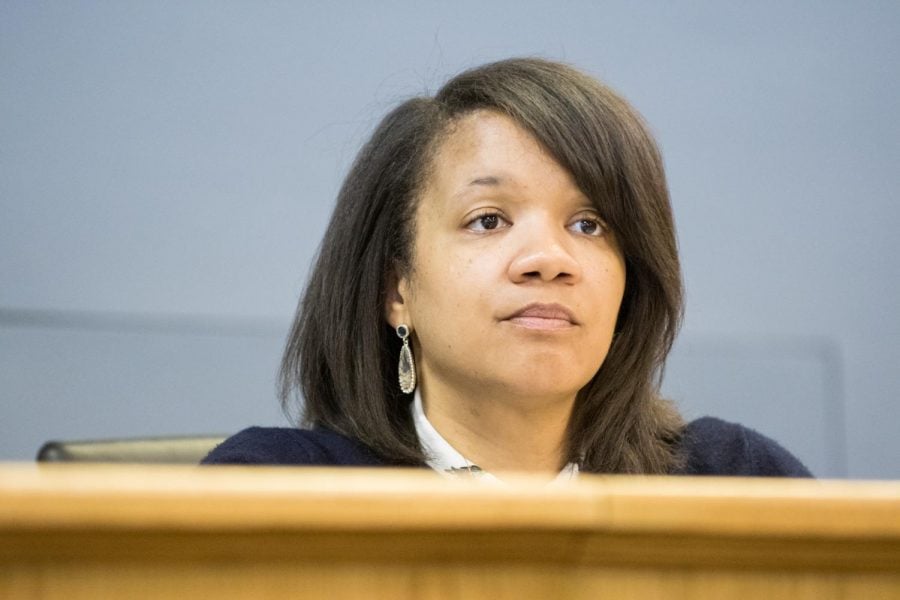Ald. Rue Simmons speaks at national reparations forum following Congressional hearing on H.R. 40
Daily file photo by Colin Boyle
Ald. Robin Rue Simmons (5th) at a City Council meeting in 2018. Rue Simmons discussed Black reparations and Japanese American redress with writer John Tateishi in a virtual Day of Remembrance event Sunday.
February 18, 2021
Ald. Robin Rue Simmons (5th) spoke at a national reparations forum Wednesday to share details on Evanston’s reparations efforts, which will act as a model for other municipalities.
The forum was hosted by the National Coalition of Blacks for Reparations in America (N’COBRA) and the National Black Cultural Information Trust (NBCIT). It occurred just hours after a House Judiciary subcommittee reviewed H.R. 40, a bill that would establish a commission to study and develop policy for reparations at the federal level. H.R. 40 has been introduced in every congressional session since 1989, but has never been passed.
Rue Simmons, the chair of Evanston’s reparations subcommittee, said the city’s efforts, which center around housing and economic justice, stemmed from a focus on local history and injustices. The first facet of Evanston’s reparations initiative is a homeownership assistance program with $400,000 budgeted to assist descendants of Evanston residents who faced housing discrimination due to city rules between 1919 and 1969.
“We decided to advance reparative justice in the form of reparations for Blacks in Evanston, and not wait on H.R. 40,” Rue Simmons said. “We did it appropriately and in line with the injury that is documented and able to be defended in our city. And that’s largely found in the area of housing, zoning and other wealth-stripping actions.”
The forum was moderated by Matsimela Mapfumo, also known as Rev. Mark Thompson, a longtime activist and host of the daily podcast Make It Plain. Offering questions on both H.R. 40 and reparations in general, Mapfumo challenged critics of H.R. 40, and pointed to Evanston’s efforts as an example of more direct reparative work.
“If you don’t agree with H.R. 40, or you’re not happy with it… We can say, ‘let’s do a commission and see what forms reparations can take,’” Mapfumo said. “In the meantime, (you) could be doing something in (your) own locale, as what has happened in Evanston.”
Rue Simmons said the success of grassroots organizing in Evanston is indicative of the strategy’s viability in cities nationwide.
She specifically referenced Amherst, Mass., which recently voted unanimously to commit to a reparations program of its own.
“The model has been introduced in Evanston, and many other cities now, including Amherst,” Rue Simmons said. “Just start the work. Reach out to your elected, and your elected can take it there.”
Rue Simmons also emphasized Evanston’s success can be replicated elsewhere.
After Evanston’s initial commitment to reparations in July 2019, Rue Simmons said an outpouring of community support gave the project an encouraging start.
“Once you say reparations is the commitment in your city, you will be surprised,” Rue Simmons said. “We’ve had law firms, and law departments at universities, and independent family foundations, and international institutions that have reached out to help our city. And I believe that (they) would apply to other cities in this nation.”
The international community can also exert pressure on the U.S. to implement reparations, panelists said. Dreisen Heath, a researcher with Human Rights Watch, said she is encouraged by the overseas support reparations has received in the last several years.
“Through the Universal Periodic Review with the United Nations, we have brought the issue of reparations… as something that countries need to flag for the United States to rectify,” Heath said. “I think it’s an opportunity, and some bodies have taken steps to properly acknowledge what needs to be done.”
As he ended the forum, Mapfumo praised Rue Simmons for her efforts in Evanston.
“This is what a Black elected official’s supposed to do,” Mapfumo said. “A Black elected official who is pushing forward something like this, in a piece of creative legislation for our people. We are thankful for that.”
Email: [email protected]
Twitter: @alexhairysun
Related Stories:
— Homeownership assistance reparations program continues to take shape
— Reparations subcommittee backs national reparations bills, talks progress updates during town hall


